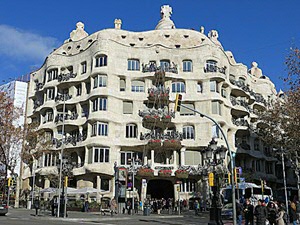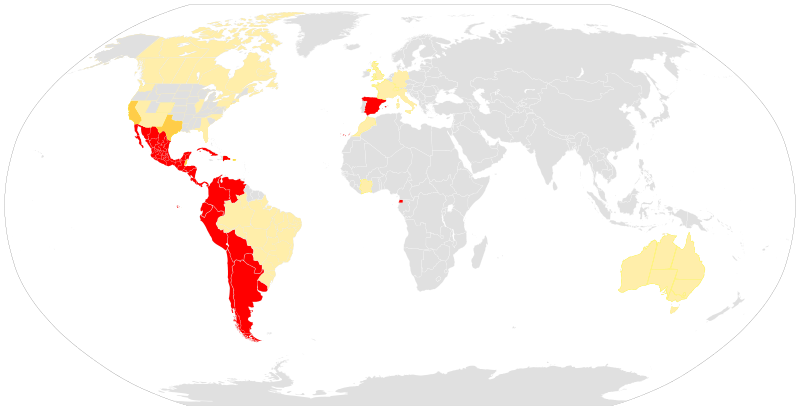Spaans studeren binnen Europese talen en culturen

Spaans is na het Chinees de meest gesproken moedertaal ter wereld. Spaans wordt gesproken in de meeste Latijns-Amerikaanse landen en in delen van de Verenigde Staten. De specialisatie Spaans binnen Europese Talen en Culturen aan de Rijksuniversiteit Groningen geeft je een zeer brede kennis van de Spaanse taal, geschiedenis, cultuur en politiek in relatie tot de omringende wereld.
Misschien heb je Spaans als een boeiend schoolvak ervaren, ben je naar een Spaanstalig land gereisd, of ben je gecharmeerd van de muziek van Shakira. Er zijn tal van redenen waarom je zou kunnen kiezen voor de specialisatie Spaans binnen Europese Talen en Culturen, en dat is een verstandige keuze, want bijna een half miljard mensen over de hele wereld spreken deze taal. Zelfs in New York hoor je overal Spaans om je heen.

Waarom Spaans?
Door Spaans te leren kun je Spaanssprekende gemeenschappen beter leren begrijpen en er actief aan deelnemen, en meer te weten komen over de complexiteit van de Spaanssprekende landen, hun geschiedenis en hun samenlevingen.
Naast je te verdiepen in de Spaanse taal, leer je samen met je medestudenten Europese Talen en Culturen in Groningen over maatschappelijke ontwikkelingen en de rol die taal daarin speelt, over literatuur en cultuur, geschiedenis en Europese politiek. Je leert hoe deze gebieden elkaar altijd hebben beïnvloed en niet stoppen bij landsgrenzen. Zo bespreek je bijvoorbeeld de erfenis van het Europese kolonialisme in Latijns-Amerika, de impact van politieke onrust op literatuur en kunst, maar ook bredere maatschappelijke fenomenen als immigratie, genderidentiteit en nationalisme in de Spaanstalige wereld.
Je krijgt de mogelijkheid om cursussen te volgen in de Spaanse taal op het gebied van (socio)-linguïstiek, literatuur en cultuur, en politiek. In deze cursussen zul je onderwerpen tegenkomen als het functionele/communicatieve verschil tussen de twee enkelvoudige verleden tijden in het Spaans aan de hand van echte taalvoorbeelden, Frida Kahlo's reacties op de Mexicaanse Revolutie en de samensmelting van activisme en conceptuele kunst in de context van de Chileense militaire dictatuur.
Een belangrijk onderdeel van je studie is een verblijf in het buitenland tijdens je tweede of derde jaar. De Faculteit der Letteren heeft hiervoor contacten en overeenkomsten met universiteiten in zowel Spanje als Latijns-Amerika. Naast een uitwisseling op locatie, nemen studenten tijdens de Spaanse taalvaardigheidscursussen deel aan virtuele uitwisselingen met studenten uit andere Spaanssprekende landen zoals El Salvador, Mexico, Perú of Spanje.
De combinatie van Spaans en Europese Talen en Culturen maakt je geschikt voor verschillende carrières. Sommige afgestudeerden hebben banen gevonden in de communicatie bij bedrijven die zaken doen in Spaanstalige landen, of bij NGO's. Je kunt de opdrachten en werkstukken voor deze profielvakken in je doeltaal schrijven en je ook op een bepaald vakgebied concentreren. Je kunt ook bij een uitgeverij gaan werken, in de diplomatieke wereld, leraar worden of een vervolgopleiding tot vertaler volgen.
Terug naar Europese talen en culturen.

'De taalcolleges aan de RUG zijn geweldig'
De keuze om Spaans te studeren als onderdeel van de bacheloropleiding Europese Talen en Culturen kwam voort uit mijn waardering voor Spaanse en Latijns-Amerikaanse cultuur. Als kind was ik al gefascineerd door spaanse films en sindsdien heb ik de melodieuze taal willen kunnen spreken. Spaans leren is dan ook altijd een droom van mij geweest. Bovendien is Spaans een van de meest gesproken talen ter wereld en biedt het toegang tot een ongelooflijk rijk en divers cultureel landschap en mogelijkheden om te reizen.
De taalcolleges aan de RUG zijn geweldig. Onze docenten leren ons gepassioneerd over de fijne kneepjes van de Spaanse taal, met name de grammatica, die soms moeilijk kan zijn. Een van mijn favoriete onderdelen van het programma zijn de wekelijkse 'Intercambio-sessies': online bijeenkomsten van een uur met moedertaalsprekers van het Spaans waarin we culturele onderwerpen en thema's bespreken die we in de lessen hebben behandeld. Bovendien, als boekenliefhebber, geniet ik erg van onze methode om Spaans te leren door middel van films en literatuur. Deze aanpak zorgt ervoor dat het leerproces natuurlijk en boeiend aanvoelt, waardoor ontspanning en taalverwerving hand in hand gaan.
Nu ik net klaar ben met mijn eerste jaar, kijk ik uit naar de komende cursussen die zich specifiek richten op de Spaanssprekende wereld. Ik ben ook enthousiast over het vooruitzicht op een buitenland minor in een Spaanstalig land, bij voorkeur Mexico. De kans om mezelf onder te dompelen in de Mexicaanse cultuur is iets waar ik enorm veel zin in heb, en ik denk dat het mijn begrip en waardering van de taal en de culturele context zal verdiepen, terwijl ik uitkijk naar het ontdekken van de levendige cultuur, tradities en geschiedenis.
| Laatst gewijzigd: | 17 juni 2025 09:07 |
